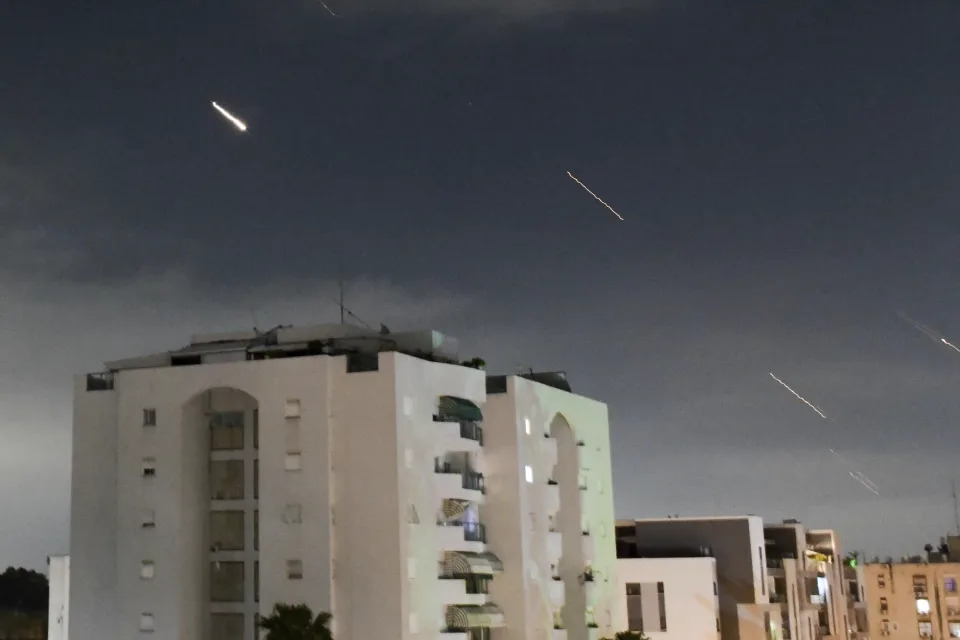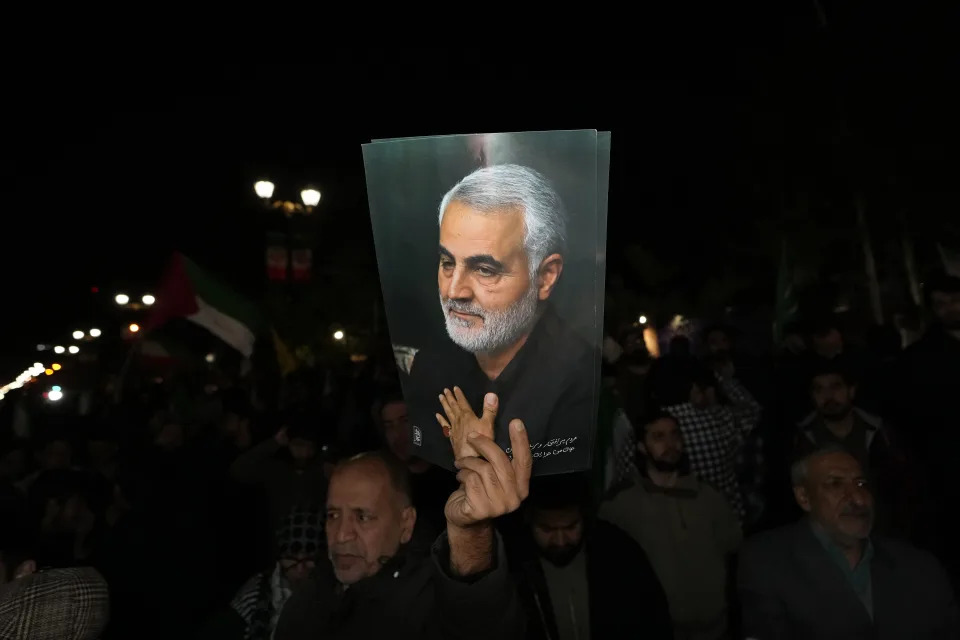Israel hails 'success' in blocking Iran's unprecedented attack. Biden now seeks diplomatic response

Israel on Sunday hailed its successful air defenses in the face of an unprecedented attack by Iran, saying it and its allies thwarted 99% of the more than 300 drones and missiles launched toward its territory. But regional tensions remain high, amid fears of further escalation in the event of a possible Israeli counter-strike.
Israeli Iron Dome air defense system launches to intercept missiles fired from Iran, in central Israel, Sunday, April 14, 2024. Iran launched its first direct military attack against Israel on Saturday. The Israeli military says Iran fired more than 100 bomb-carrying drones toward Israel. Hours later, Iran announced it had also launched much more destructive ballistic missiles.
U.S. President Joe Biden said he would convene a meeting of the Group of Seven advanced democracies on Sunday “to coordinate a united diplomatic response to Iran’s brazen attack.” The language indicated that the Biden administration does not want Iran’s assault to spiral into a broader military conflict.
Iran launched the attack in response to a strike widely blamed on Israel on an Iranian consular building in Syria earlier this month which killed two Iranian generals. Israel said Iran launched 170 drones, more than 30 cruise missiles and more than 120 ballistic missiles.
By Sunday morning, Iran said the attack was over and Israel reopened its air space.
The two foes have for years been engaged in a shadow war marked by incidents like the Damascus strike. But Sunday’s assault, which set off air raid sirens across Israel, was the first time Iran has launched a direct military assault on Israel, despite decades of enmity dating back to the country’s 1979 Islamic Revolution.
Israel has over the years established – often with the help of the United States — a multilayered air-defense network that includes systems capable of intercepting a variety of threats including long-range missiles, cruise missiles, drones and short-range rockets.
That system, along with collaboration with the U.S. and other forces, helped thwart what could have been a far more devastating assault at a time when Israel is already bogged down in its war against Hamas in Gaza and engaged in low-level fighting on its northern border with Lebanon's Hezbollah militia. Both Hamas and Hezbollah are backed by Iran.
Israeli and U.S. officials lauded the response to the aerial assault.
“Iran launched more than 300 threats and 99% were intercepted,” said Rear Adm. Daniel Hagari, the Israeli military spokesman. “That is a success.” Asked if Israel would respond, Hagari said the country would do what was needed to protect its citizens.
Hagari said that none of the drones and cruise missiles reached Israel and that only a few of the ballistic missiles got through. He said that of the cruise missiles, 25 were shot down by the Israeli air force.
Hagari said minor damage was caused to an Israeli airbase, but he said it was still functioning. Rescuers said a 7-year-old girl was seriously wounded in southern Israel, apparently in a missile strike, though they said police were still investigating the circumstances of her injuries.
Israeli Prime Minister Benjamin Netanyahu posted a short message on X, formerly Twitter: “We intercepted. We blocked. Together, we will win.”
Defense Minister Yoav Gallant also celebrated the results, thanking the U.S. and other countries for their assistance.
Israel announced it reopened its airspace, loosening one restriction it had imposed ahead of the strike, although schools remained closed around the country and traffic on the first day of the Israeli workweek was lighter than usual as many people stayed home or recovered from the long night. Neighboring Jordan also reopened its airspace.
Gen. Mohammad Hossein Bagheri, the chief of staff of the Iranian armed forces, said the operation was over, the state-run IRNA news agency reported.
“We have no intention of continuing the operation against Israel,” he was quoted as saying.
Iran's president, Ebrahim Raisi, claimed Iran had taught Israel a lesson and warned that "any new adventures against the interests of the Iranian nation would be met with a heavier and regretful response from the Islamic Republic of Iran.”
Israel may be particularly proud of the success of its defense because it stands in sharp contrast to the failures it endured during Hamas’ attack on Oct. 7. Facing a far less powerful enemy in Hamas, Israel’s border defenses collapsed and the military took days to repel the marauding militants – an embarrassing defeat for the Middle East’s strongest and best-equipped army.
While thwarting the Iranian onslaught could help restore Israel’s image, what it does next will be closely watched both in the region and in Western capitals.
In Washington, Biden said U.S. forces helped Israel down “nearly all” the drones and missiles and pledged to convene allies to develop a unified response.
Biden, who had cut short a weekend stay at his Delaware beach house to meet with his national security team at the White House on Saturday afternoon, spoke with Netanyahu later in the day.
“I told him that Israel demonstrated a remarkable capacity to defend against and defeat even unprecedented attacks – sending a clear message to its foes that they cannot effectively threaten the security of Israel,” Biden said.
Secretary of State Antony Blinken said the U.S. does “not seek escalation,” and would hold talks with its allies in the coming days.
The U.S., along with its allies, has sent direct messages to Tehran to warn against further escalating the conflict. Leaders from the G7 will hold a video conference on Sunday early afternoon to discuss the Iranian strikes against Israel, according to Italy, which holds the presidency of the group of developed countries, which includes the United States, Japan, Germany, France, Britain, and Canada.
Iran's paramilitary Revolutionary Guard issued a new threat against the U.S. "The terrorist U.S. government is warned any support or participation in harming Iran’s interests will be followed by decisive and regretting response by Iran’s armed forces," said a statement carried by IRNA.
Israel and Iran have been on a collision course throughout Israel’s six-month war against Hamas militants in Gaza, triggered by the Oct. 7 attack on Israel. On that day, militants from Hamas and Islamic Jihad, also backed by Iran, killed 1,200 people in Israel and kidnapped 250 others.
An Israeli offensive in Gaza has caused widespread devastation and killed over 33,000 people, according to local health officials.
Negotiations underway, meant to bring about a cease-fire in exchange for the release of the hostages, appeared to hit a setback Sunday. Netanyahu’s office said that Hamas rejected the latest proposal for a deal, which had been presented to Hamas a week ago by mediators Qatar, Egypt and the United States.
A Hamas official said the group wants a “clear written commitment” that Israel will withdraw from the Gaza Strip during the second of a three-phase cease-fire deal. The deal presented to the sides calls for a six-week cease-fire in Gaza, during which Hamas would release 40 of the more than 100 hostages the group is holding in the enclave in exchange for 900 Palestinian prisoners from Israel’s jails, including 100 serving long sentences for serious crimes.
Hamas welcomed Iran's attack, saying it was “a natural right and a deserved response” to the strike in Syria and urged the Iran-backed groups in the region to continue to support Hamas in the war against Israel.
Almost immediately after the war erupted, Hezbollah began attacking Israel’s northern border. The two sides have been involved in daily exchanges of fire, while Iranian-backed groups in Iraq, Syria and Yemen have launched rockets and missiles toward Israel.
Iran's attack on Israel raised fears of a wider war, but all sides in the conflict also scored gains
A demonstrator holds up a poster of the late Iranian Revolutionary Guard Gen. Qassem Soleimani, who was killed in a U.S. drone attack in 2020 in Iraq, during an anti-Israeli gathering in front of the British Embassy in Tehran, Iran, early Sunday, April 14, 2024. Iran launched its first direct military attack against Israel on Saturday.
The unprecedented attack by Iran on Israel early Sunday ratcheted up regional tensions, confirming long-held fears about the Israel-Hamas war spiraling into a broader conflagration. But Iran, Israel, the United States and Hamas also walked away with some gains.
Here’s a look at the fallout.
ISRAEL'S RESPONSE COULD RESTORE FAITH IN ITS MILITARY
As the more than 300 drones and missiles headed toward Israel in the early hours of Sunday, the country was able to successfully put to the test its aerial defense array, which, along with help from allies, blocked 99% of the projectiles and prevented any major damage.
By contrast, Israel's military had suffered a bruising defeat at the hands of a far less equipped enemy when Hamas stormed from Gaza into Israel on Oct. 7. That was a major blow to Israel’s image as a regional military powerhouse and shattered any sense of invincibility. The response to Iran's attack could be what restores faith in the country's military, even as its forces are bogged down in Gaza, more than six months after Israel declared war on Hamas there.
Israel has also boasted about the coalition of forces that helped it repel the Iranian assault. It's a much-needed show of support at a time when Israel is at its most isolated because of concerns surrounding its conduct during the war against Hamas, including a worsening humanitarian crisis and a staggering death toll in Gaza.
IRAN SHOWS OFF ITS MIGHT
Iran vowed repeatedly that it would respond to an apparent Israeli strike on an Iranian diplomatic compound in Damascus on April 1 that killed two generals. Sunday's assault allowed Iran to show to its citizens that it won’t stand by when it assets are attacked and that it was serious when it threatened revenge.
With its strike, Iran was able to exhibit its fierce firepower, instill fear in some Israelis and disrupt the lives of many through school cancellations. But with little damage actually caused in Israel, Iran might hope that any response will be measured. Several hours after it launched the drones and missiles, Iran said the operation was over.
THE UNITED STATES STOOD BY ISRAEL
The U.S. was a key player in repelling the assault, demonstrating to its allies around the world the power and reliability of American support.
Now, as Israel mulls how and whether to respond, that alliance will be put to the test, with the Biden administration seeking to exert its leverage on Israel and prevent it from carrying out a response that might worsen the conflict.
HAMAS MAY BENEFIT FROM IRAN'S DIRECT INVOLVEMENT
Hamas, which is backed by Iran, welcomed the strike on Israel. Since launching its Oct. 7 attack, Hamas had hoped that regional partners might come to its assistance and drag Israel into a broader war. While some have done — including the Iranian-backed Hezbollah in Lebanon and Yemen’s Houthis — Iran had not directly entered the fray until Sunday.
Hamas could hope that the attack is the first salvo in deeper Iranian engagement in the war in Gaza. It also could hope that violence in the West Bank, where an Israeli teen was killed and settlers rampaged in Palestinian towns, continues to heat up. At the very least, Iran’s attack may have emboldened Hamas to dig in its heels in current negotiations over a cease-fire, hoping the increased military pressure on Israel might lead it to accept the militant group's harder-line terms for a deal.
US helps Israel shoot down 'nearly all' Iran-launched attack drones as Biden vows support
In this image provided by the White House, President Joe Biden, along with members of his national security team, receive an update on an ongoing airborne attack on Israel from Iran, as they meet in the Situation Room of the White House in Washington, Saturday, April 13, 2024. From left to right, facing Biden are, Central Intelligence Agency Director William Burns; Avril Haines, Director of National Intelligence; Secretary of State Antony Blinken and National Security Advisor Jake Sullivan. Some papers on the desk have been blurred by the source for national security reasons.
President Joe Biden on Saturday lauded American forces who helped Israel down “nearly all” of the drones and missiles fired by Iran and vowed to coordinate a global response to Tehran's unprecedented attack. And the Pentagon said its forces intercepted “dozens of missiles” and drones launched from Iran, Iraq, Syria and Yemen that were headed toward Israel.
With regional tensions at their highest since the Israel-Hamas war began six months ago, Biden pledged that American support for Israel's defense against attacks by Iran and its proxies is “ironclad.” The attack marked the first time Iran has launched a direct military assault on Israel, risking a wider regional conflict.
The U.S. and Israel had been bracing for an attack for days after Iran said it would retaliate for a suspected Israeli strike this month on an Iranian consular building in Syria that killed 12 people, including two senior Iranian generals in the Revolutionary Guard’s elite Quds Force.
“At my direction, to support the defense of Israel, the U.S. military moved aircraft and ballistic missile defense destroyers to the region over the course of the past week,” Biden said in a statement late Saturday. "Thanks to these deployments and the extraordinary skill of our servicemembers, we helped Israel take down nearly all of the incoming drones and missiles."
Defense Secretary Lloyd Austin in a statement said the U.S. took out dozens of the attacks, but did not provide details on ships or aircraft involved in the operation that commanders had been preparing for over the past two weeks.
“Our forces remain postured to protect U.S. troops and partners in the region, provide further support for Israel’s defense, and enhance regional stability,” Austin said, adding that troops are standing ready to prevent any further conflict.
Biden had cut short a weekend stay at his Delaware beach house to meet with his national security team at the White House on Saturday afternoon, returning to Washington minutes before Israeli officials confirmed that they had detected drones being launched toward their territory from Iran.
He convened a principals meeting of the National Security Council in the White House Situation Room to discuss the unfolding situation, the White House said, before speaking with Israeli Prime Minister Benjamin Netanyahu late Saturday.
“I told him that Israel demonstrated a remarkable capacity to defend against and defeat even unprecedented attacks – sending a clear message to its foes that they cannot effectively threaten the security of Israel,” Biden said.
Biden added that he would convene a meeting of the Group of Seven advanced democracies on Sunday “to coordinate a united diplomatic response to Iran’s brazen attack.”
The Pentagon reported that Austin had spoken twice, including late Saturday night, with his Israeli counterpart to praise the “extraordinary defensive measures and strong cooperation undertaken to defeat this Iranian attack against Israel” and again stated clearly that "Israel could count on full U.S. support to defend Israel against any future attacks by Iran and its regional proxies.” National security adviser Jake Sullivan also spoke with his counterpart to reinforce Washington's “ironclad commitment to the security of Israel.”
National Security Council spokesperson Adrienne Watson said in a Saturday statement that “Iran has begun an airborne attack against Israel.” She added: “The United States will stand with the people of Israel and support their defense against these threats from Iran.”
Biden on Friday said the United States was "devoted” to defending Israel and that “Iran will not succeed.” Asked by reporters what his message was for Iran, the president’s only reply was: “Don’t.”
He ignored a question about what would trigger a direct U.S. military response.
The U.S., along with its allies, have sent direct messages to Tehran to warn against further escalating the conflict.
During the Israel-Hamas war in Gaza, there have been near-daily exchanges of fire between Israeli forces and the Iran-backed Hezbollah militant group along the Israel-Lebanon border. U.S. officials have recorded more than 150 attacks by Iran-backed militias in Iraq and Syria on U.S. forces at bases in those countries since war started on Oct. 7.
One attack in late January killed three U.S. service members in Jordan. In retaliation, the U.S. launched a massive air assault, hitting more than 85 targets at seven locations in Iraq and Syria.
Meantime, on Saturday, commandos from Iran’s paramilitary Revolutionary Guard rappelled from a helicopter onto an Israeli-affiliated container ship near the Strait of Hormuz and seized the vessel.
Watson, the NSC spokesperson, said the U.S. strongly condemned the seizure and urged Iran to release the ship and crew immediately.
“We will work with our partners to hold Iran to account for its actions,” she said.
Also Saturday, the Israeli-occupied West Bank also saw some of the worst violence since Hamas' attack on Israel.
- Questions and Answers
- Opinion
- Story/Motivational/Inspiring
- Technology
- Art
- Causes
- Crafts
- Dance
- Drinks
- Film/Movie
- Fitness
- Food
- Jogos
- Gardening
- Health
- Início
- Literature
- Music
- Networking
- Outro
- Party
- Religion
- Shopping
- Sports
- Theater
- Wellness
- News
- Culture
- War machines and policy




